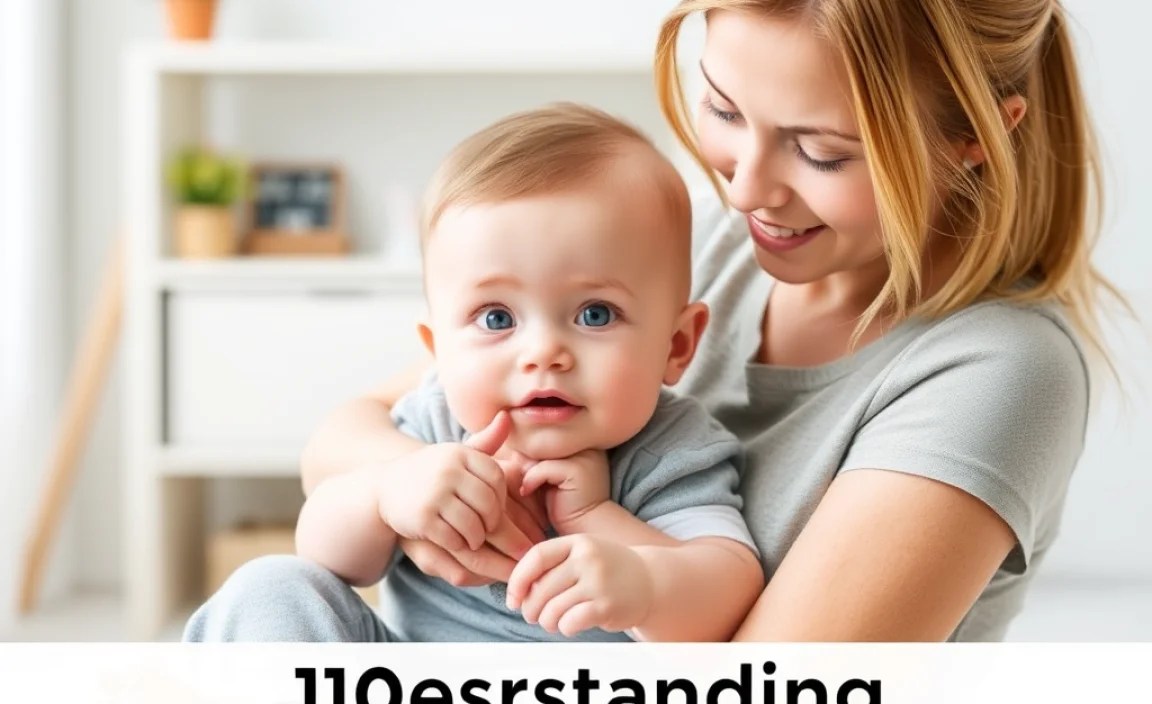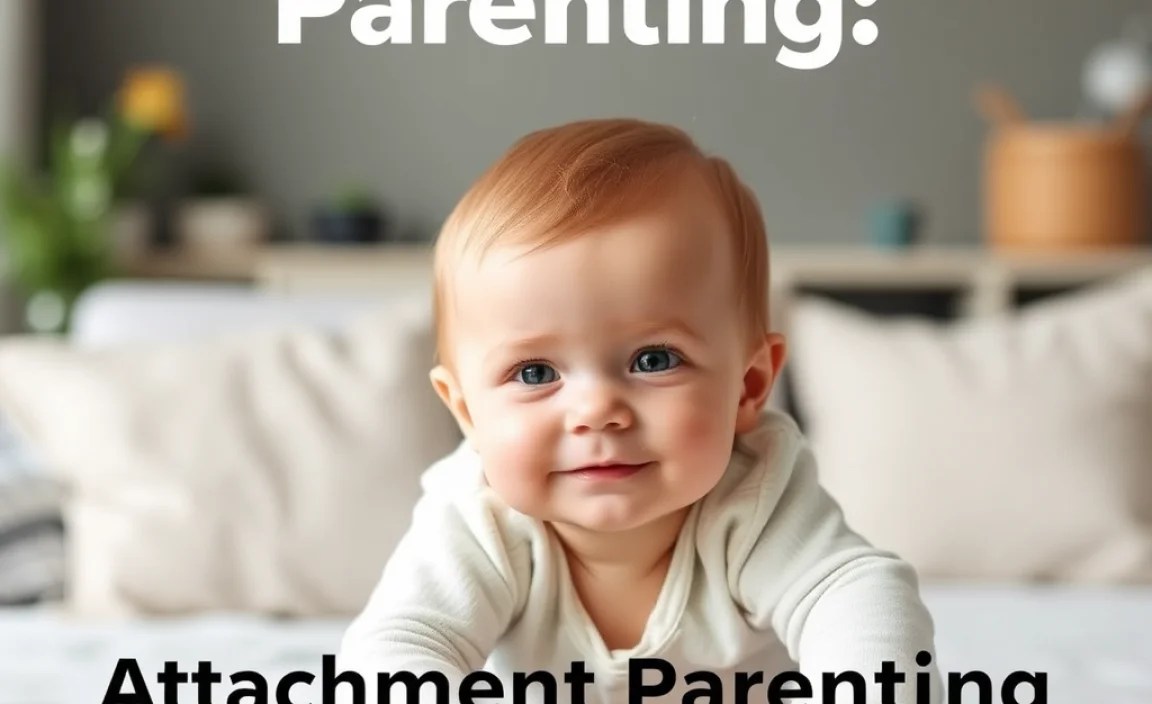Have you ever wondered how some parents form such strong bonds with their kids? Well, they might be using something called attachment parenting. This is a special way parents raise their children. It focuses on building a close and loving relationship. So, what are the attachment parenting pros and cons? Let’s dive in to find out more about this parenting style!
At A Glance
Key Takeaways
- Attachment parenting focuses on building strong parent-child bonds.
- It includes practices like co-sleeping and baby-wearing.
- There are both pros and cons to this parenting style.
- Some parents find great success, while others face challenges.
- Understanding attachment parenting pros and cons helps make informed choices.
Understanding Attachment Parenting

Attachment parenting is a style that emphasizes a close relationship between parents and children. This approach encourages parents to respond quickly to their baby’s needs. They often use methods like co-sleeping, baby-wearing, and breastfeeding. But why do some parents choose this style? They believe it helps create a deep, loving bond that lasts a lifetime.
- Focuses on emotional connection.
- Encourages baby-wearing for closeness.
- Promotes breastfeeding when possible.
- Involves co-sleeping practices.
- Emphasizes quick response to needs.
Not every family finds attachment parenting easy. It requires time and patience. Some parents say it’s worth it for the bond they create. Others feel overwhelmed by the constant attention needed. Like anything, it’s important to find a balance that works for your family.
Fun Fact: Did you know baby-wearing has been practiced for centuries in many cultures?
Why Choose This Parenting Style?
Why do some families prefer attachment parenting? It all comes down to connection. Parents want to feel close to their children. They hope this bond will help kids grow up happy and secure. Have you ever felt closer to someone just by spending more time with them? That’s what attachment parenting is all about. It’s about being there and showing love in every moment.
Who Benefits From Attachment Parenting?
Both parents and children can benefit from attachment parenting. Parents feel more connected and in tune with their kids. Children, in turn, feel safe and loved. Imagine feeling like someone is always there for you, no matter what. That’s the security attachment parenting aims to provide.
Understanding the Criticisms
While some families thrive with attachment parenting, others face challenges. Critics say it can be overwhelming. Imagine always having to be available, even when you’re tired. Some parents struggle with this demand. They worry about not having any personal time. It’s important to weigh these concerns when deciding if this style suits your family.
Attachment Parenting Pros and Cons

Let’s take a closer look at the attachment parenting pros and cons. This style has many positive aspects. But, it also presents challenges. Understanding both sides can help parents decide what’s right for their family.
- Promotes strong emotional bonds.
- Encourages constant parental presence.
- Can be time-consuming and overwhelming.
- May limit personal time for parents.
- Might not suit all family dynamics.
For some, the pros outweigh the cons. They love the closeness and connection. Others find it too demanding. It’s crucial to assess what fits best with your lifestyle and needs. Balancing your well-being with your child’s needs is key.
Fun Fact: Attachment parenting can positively impact a child’s brain development.
Emotional Benefits for Children
Attachment parenting aims to help children feel secure and loved. This emotional security can lead to greater confidence as they grow. Imagine a safety net that catches you whenever you fall. That’s how attachment parenting tries to make children feel. They know their parents are always there, ready to support them.
The Demands on Parents
Attachment parenting requires a lot of time and energy from parents. It can be exhausting to always be available. Have you ever felt tired after a busy day? Now, imagine feeling that way every day. It’s essential for parents to find ways to take breaks and recharge.
Finding a Balance
Some parents mix attachment parenting with other styles. This balance helps them meet their children’s needs without burning out. It’s like having the best of both worlds. They stay close to their kids but also find time for themselves. This flexible approach can be very helpful.
Day-to-Day Practices

What do attachment parenting practices look like daily? It’s more than just a set of rules. It’s about making intentional choices that support a strong bond. These choices include how you respond to your child, sleep arrangements, and daily interactions.
- Responding quickly to cries.
- Practicing co-sleeping if comfortable.
- Using gentle discipline methods.
- Encouraging lots of physical contact.
- Focusing on positive communication.
Each family’s day may look a little different. Some love co-sleeping, while others find it uncomfortable. The key is to find what works for everyone involved. Flexibility and communication are important to keep things running smoothly.
Fun Fact: Co-sleeping is common in many cultures around the world.
Handling Sleep Arrangements
Many attachment parents choose to co-sleep. It’s a way to stay close during the night. But what if someone snores or moves a lot? Finding the right sleep setup is crucial. It’s about ensuring everyone gets rest while staying connected. Some families use side-car cribs for extra space.
Responding to Your Child
Attachment parenting encourages quick responses to a child’s needs. This response builds trust and security. Have you ever seen a baby calm down as soon as they’re picked up? That’s the power of a fast and loving response. It reassures the child that they are safe and cared for.
Effective Communication
Good communication is key in attachment parenting. It’s not just about talking; it’s about listening, too. Imagine a conversation where both people feel heard and understood. That’s the goal. Parents use positive language and encourage open dialogue with their kids. It creates a supportive environment.
Attachment Parenting and Child Development

Attachment parenting can positively affect a child’s development. It focuses on building a secure attachment, which is crucial for growth. Children feel safe and supported, allowing them to explore the world confidently. This strong bond can influence their emotional and social development.
- Encourages secure emotional connections.
- Supports healthy brain development.
- Promotes social skills and empathy.
- Builds lifelong trust and security.
- Enhances problem-solving abilities.
When children feel secure, they are more likely to take risks and learn new things. This confidence can help them in school and social situations. Parents who use attachment parenting often see their children thrive in these areas. The love and support they receive lay a strong foundation for the future.
Fun Fact: Secure attachments in childhood can lead to healthier adult relationships.
Fostering Emotional Intelligence
Attachment parenting helps develop emotional intelligence in children. They learn to recognize and express their feelings healthily. Have you ever felt like someone truly understands you? That’s the result of strong emotional intelligence. It’s a valuable skill that can lead to success in many areas of life.
Encouraging Social Skills
Children raised with attachment parenting often develop good social skills. They learn empathy and how to connect with others. Imagine a child who easily makes friends because they understand how others feel. That’s the kind of social awareness this parenting style fosters.
Influencing Long-Term Development
The effects of attachment parenting can last a lifetime. Children grow into adults with strong, secure relationships. Imagine feeling confident in your abilities and trusting those around you. That’s the positive impact attachment parenting can have on a child’s future.
| Aspect | Pros | Cons |
|---|---|---|
| Emotional Bond | Strong parent-child connection | Requires constant attention |
| Time Commitment | Deepens relationship | Can be exhausting |
| Child Development | Enhances emotional growth | May limit parent’s time |
| Independence | Fosters trust | Some children become overly dependent |
Conclusion
Attachment parenting has both positives and negatives. It promotes a close bond but demands a lot of time. Understanding attachment parenting pros and cons helps parents decide if it’s right for them. Balancing these factors is key to a happy family life.
FAQs
Question: What is attachment parenting?
Answer: Attachment parenting is a style that focuses on building strong emotional bonds between parents and children. It involves practices like co-sleeping, breastfeeding, and baby-wearing to encourage closeness and connection.
Question: What are the benefits of attachment parenting?
Answer: The benefits include creating a strong emotional bond, promoting secure attachments, and supporting healthy child development. Children often feel loved and secure, which can positively affect their social and emotional growth.
Question: Are there any downsides to attachment parenting?
Answer: Yes, there are some cons. Attachment parenting can be time-consuming and overwhelming for parents. It requires a lot of attention, which may reduce personal time. It’s essential to understand attachment parenting pros and cons when deciding if it’s right for your family.
Question: Is attachment parenting suitable for every family?
Answer: Not every family finds attachment parenting suitable. It depends on personal circumstances and preferences. Each family should assess their needs and decide if this parenting style fits their lifestyle and goals.
Question: How can parents balance attachment parenting with personal time?
Answer: Finding balance involves setting boundaries and taking breaks. Parents can mix attachment parenting with other styles. Flexibility helps in maintaining a healthy lifestyle while ensuring strong family bonds.
Question: Can attachment parenting affect a child’s independence?
Answer: Attachment parenting may impact independence. Some children may become overly reliant on their parents. However, with proper guidance, they can develop autonomy while still feeling secure and supported.

